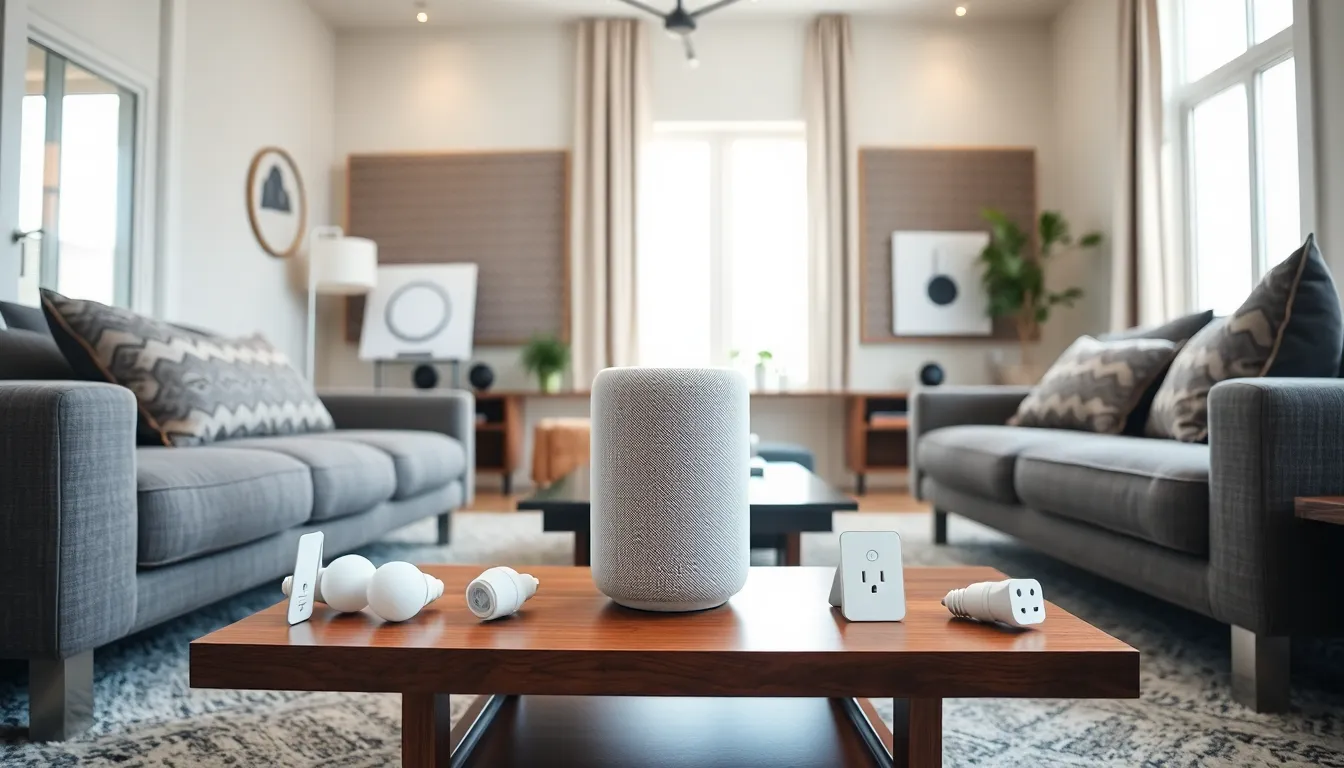As summer approaches and temperatures soar, the quest for a cool oasis begins. Enter smart air conditioners—the superheroes of home comfort. These high-tech marvels not only keep spaces refreshingly cool but also promise to save energy and money. Who wouldn’t want to chill out while their utility bills chill down?
Table of Contents
ToggleOverview of Smart Air Conditioners
Smart air conditioners represent a significant advancement in home climate control technology. These units utilize Wi-Fi connectivity, enabling users to manage settings remotely via mobile devices. Energy efficiency stands out as a key benefit, with many models incorporating features that automatically adjust operation based on occupancy and preferences.
Advanced sensors monitor indoor conditions, which promotes optimal cooling and reduces energy waste. Users can set schedules, allowing the air conditioner to operate only when necessary. Additionally, integration with smart home systems enhances convenience; syncing with voice assistants makes controlling temperature a hands-free experience.
Data analytics often play a vital role in these systems. By analyzing usage patterns, smart air conditioners can optimize performance and provide insights into energy consumption. Savings can average 20 to 30 percent on energy bills compared to traditional models.
Another noteworthy feature is the capability for intelligent diagnostics. Smart air conditioners can identify maintenance needs before they turn into major issues. For instance, they might alert users about filter changes or potential malfunctions, increasing the lifespan of the unit.
Many smart air conditioners also support multiple cooling modes, allowing for customization. Features like eco-mode help conserve energy while still maintaining comfort during hot weather. Furthermore, real-time weather data integration assists in adapting settings to outdoor temperatures, which enhances user comfort and efficiency.
Investing in smart air conditioners benefits both the environment and finances. They not only enhance comfort but also align with modern sustainability goals through energy-efficient operation, proving to be an excellent addition to any home.
Key Features of Smart Air Conditioners
Smart air conditioners boast impressive features that enhance user comfort and promote energy savings. Users enjoy a range of advanced functionalities designed for modern living.
Energy Efficiency
Energy efficiency ranks as a crucial feature of smart air conditioners. These devices adjust cooling output based on room occupancy, optimizing energy use. Real-time data analytics track energy consumption patterns, enabling users to identify potential savings. Many smart air conditioners save users 20 to 30 percent on energy bills compared to traditional models. Eco-mode operations help further reduce power consumption, enabling a balance between comfort and sustainability. Advanced sensors continuously monitor indoor conditions, ensuring that energy is not wasted while maintaining an optimal environment.
Remote Control and Automation
Remote control significantly enhances the convenience of smart air conditioners. Via smartphone applications, users can adjust settings from anywhere. Automation features enable scheduling, allowing users to set specific times for cooling operations. Integration with smart home systems makes hands-free temperature adjustments possible, enhancing the user experience. Notifications alert users to upcoming maintenance needs, ensuring the system remains in peak condition. Connecting to real-time weather data also means adjustments can be made proactively, maintaining comfort efficiently.
Benefits of Using Smart Air Conditioners
Smart air conditioners enhance home comfort while saving money and energy. These systems offer numerous advantages that make them an attractive choice for homeowners.
Cost Savings
Smart air conditioners contribute to significant cost savings. Users can enjoy 20 to 30 percent reductions in energy bills compared to traditional models. Eco modes allow for optimized energy usage, maintaining comfort without excessive costs. Scheduling options further enhance savings by cooling spaces only when needed. Notifications inform users about maintenance, preventing costly repairs down the line. Ultimately, saving on energy costs aligns with both budgetary and environmental goals.
Increased Comfort
Increased comfort comes with smart air conditioners as they adapt to individual preferences. Advanced sensors monitor indoor conditions, ensuring that the environment remains pleasant. Users can set specific temperature schedules, accommodating daily routines. Additionally, remote capabilities allow for adjustments from anywhere, providing flexibility in managing comfort levels. Real-time weather data integration further optimizes cooling, guaranteeing that homes stay comfortable despite external temperature fluctuations. Overall, smart air conditioners create a consistently enjoyable indoor climate while prioritizing user preferences.
Popular Brands and Models
Smart air conditioners from various brands stand out for their advanced features and energy efficiency.
LG offers models like the LG ThinQ series, known for remote control capabilities and eco-friendly operation. This series includes features that optimize energy usage based on household patterns.
Honeywell delivers the Honeywell Olimpia model, which excels in cooling performance and smart scheduling. Its compatibility with home automation systems adds to its appeal, allowing seamless integration into smart homes.
Frigidaire manufactures models like the Frigidaire Gallery, recognized for its user-friendly app and energy-saving options. This model frequently receives high marks for maintaining consistent temperature control while minimizing electricity costs.
Midea provides a diverse lineup featuring the Midea U Inverter, which boasts a unique design for better airflow and quiet operation. Users appreciate its energy-efficient inverter technology, making it a top choice for those seeking affordability and performance.
Daikin offers innovative models like the Daikin One+, which includes smart technology for precise temperature management. This advanced system provides users with real-time energy usage data, enabling informed decisions about cooling habits.
Samsung rounds out the list with the Samsung Wind-Free series, which cools spaces without direct airflow. It’s ideal for people sensitive to traditional AC blasts. Smart features, like AI-driven performance adjustments, enhance efficiency based on occupancy patterns.
These brands and their models embody the essence of smart air conditioning technology. Each option presents unique advantages tailored to different user needs, ensuring comfort, convenience, and cost savings.
Future Trends in Smart Air Conditioning
Innovation in smart air conditioning continues to grow, driving significant advancements in technology. Integration with artificial intelligence enhances user experience by offering personalized cooling solutions. Data analytics provide insights into usage patterns, allowing systems to adapt more effectively to individual needs. Homeowners can expect smarter features that automate cooling further, adjusting in real-time to occupancy and environmental changes.
Sustainability remains a core focus in the evolution of these appliances. With growing energy concerns, newer models emphasize eco-friendly operations, utilizing materials and technologies that minimize carbon footprints. Features like energy consumption tracking empower users to make informed decisions about their cooling habits. Monitoring energy use helps consumers identify ways to improve efficiency further.
Enhanced connectivity is also on the rise. Future smart air conditioners will likely integrate seamlessly with other smart home devices, creating a unified home network. Homeowners can enjoy the convenience of controlling all systems from a single app, streamlining operations. Voice command capabilities will become increasingly prevalent, offering hands-free temperature adjustments.
Predictive maintenance is a trend gaining traction as well. Advanced sensors will alert users to potential issues before they escalate, enabling timely repairs. This proactive approach reduces unexpected breakdowns and maintenance costs over time. Additionally, future models may incorporate machine learning algorithms to refine cooling preferences based on user behavior.
As technology progresses, designs are becoming more aesthetically pleasing and compact. Manufacturers are likely to focus on integrating smart air conditioners into various home styles, blending function with visual appeal. Enhanced designs will not only improve comfort but also elevate the overall ambiance of living spaces.
Smart air conditioners are transforming the way people experience home cooling. Their energy-efficient designs and advanced features not only enhance comfort but also promote sustainability. As technology continues to evolve, these systems will likely offer even more personalized and efficient solutions for managing indoor climates.
With the ability to integrate seamlessly into smart home ecosystems, smart air conditioners provide unmatched convenience and control. The future holds exciting possibilities for these devices, including enhanced connectivity and predictive maintenance features. Adopting smart air conditioning technology is a step towards a cooler home and a more sustainable lifestyle.








